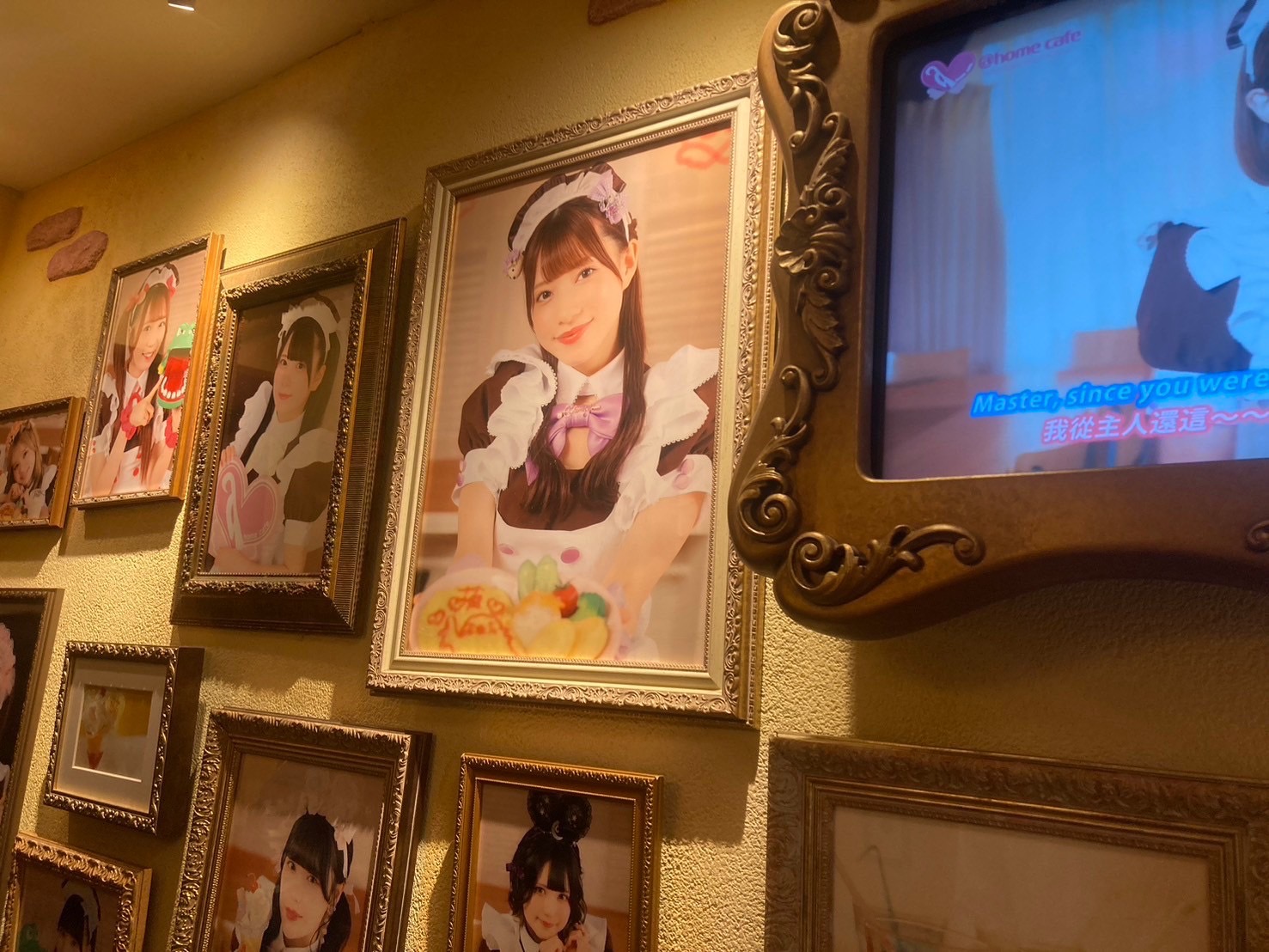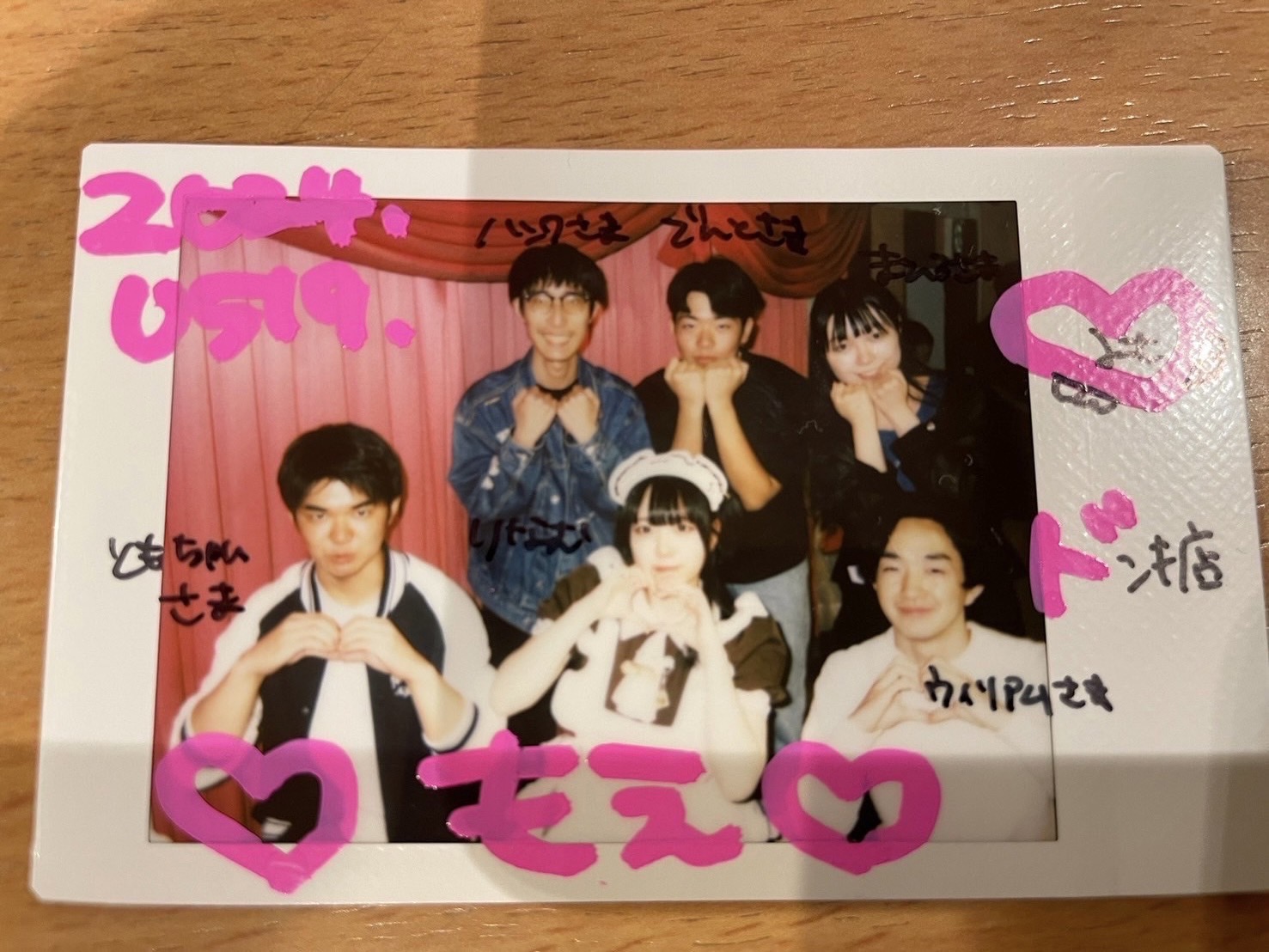At-home cafe review
We visited the At-home café Akihabara Donki Branch! We’ve written a review article about our experience.

01: At-home café Akihabara Donki Branch experience report
・A hugely popular maid café! One location even has a surprising 3-hour wait.
・Amazed by the unique world of maid café.
・Professional service available in English.
・Members drawn into a “world of fantasy “.
02: Review summary by members
Check out the impressions from first-time visiting members and an international member who experienced the maid café!
・A hugely popular maid café!One location even has a surprising 3-hour wait.
At-home café has seven locations in Akihabara. The main store occupies an entire building, from the 3rd to the 7th floor. The entrance to the main store is designed to look like a maid`s headband. It`s super cute‼ As you walk in, there`s a monitor showing the crowd status on each floor.
Photo1: Entrance
Photo2: Crowd monitor
Wow‼ The 3rd floor of the main store had an 182-minute wait! This really shows how popular At-home café is. Since it was a holiday, it was especially crowded. If your schedule allows, visiting on a weekday is recommended‼
To avoid the crowds, we headed to the At-home café Akihabara Donki Branch, which is just a 3-minute walk from the main store.
・Amazed by the unique world of maid café.
We finally arrived at the At-home café Akihabara Donki Branch, and the moment had come.
A maid called us, and we finally stepped into the maid`s world.
“Okaerinasaimase, gosyujin-sama, ojou-sama!!”?!
(Welcome home, Master, Princess)
We were greeted by smiling maids who welcomed us warmly. Every time we made eye contact, they greeted us, helping us feel more at ease. The interior is mainly pink and very clean. We were amazed by the unique atmosphere of the maid cafe.
・Professional service available in English.
When we took our seats, a maid explained the cafe’s system and menu. At At-Home Cafe, the theme is fully integrated, allowing guests to immerse themselves in an extraordinary experience.
For instance, leaving the cafe is referred to as “going out.” Why? Because At-Home Café is like returning to your mansion, where you are the master or mistress. Thus, when leaving the mansion, it becomes “going out.”
If you have any questions, the maids will kindly answer them. And as they noticed any international student among us, some maids were even available to assist in English. It made me realize that even those who aren’t confident in Japanese can enjoy the cafe’s atmosphere freely.
・Members drawn into a “world of fantasy “.
When the meals arrived, a ritual to enhance their flavor was performed. We formed a heart shape with both hands, swayed them left and right, and chanted the following spell.
“Moe, moe, kyu—–n♡”
At first, some of us were a bit shy, but gradually, we got into it. We were drawn into the world of At-Home Café. Even one member started to refer to anything pink as “Moe Moe Pink.” At At-Home Cafe, we experienced the “extraordinary” that we couldn’t find in the real world. And through that “extraordinary,” we discovered a new side of ourselves, one that could enjoy and embrace the fantasy.

02: Review summary by members
Takumi(1st visit)
Through today’s visit, I understood why maid cafes are such a popular attraction for Japanese people. I’ll admit that I initially had an unpleasant impression of maids calling the customers “masters” (goshujin-sama) as I felt it was morally unjust. However, I was able to realize the better aspects of maid cafes. The unique environment transports you away from the harsh reality of Japanese society and into a world of happiness and acceptance. The maids will complement you and treat you with importance like no other. It didn’t surprise me when I saw many working-age men and women, while the common belief was that most customers of maid cafes are middle-aged men (ojisan) who go to the café to see cute girls in maid outfits. Rather, they just wanted a little trip out of reality, just like the rest of us. Although this experience was a little bit expensive than I expected, it was worth every penny.
Tomoya(2nd visit)
This was my 2nd time visit to the maid cafe. It was still a great “home” with highly satisfactory services. We usually battle with stress. We are all under tremendous stress from our human relationships at the workplace, school, etc. If you are tired of such a daily life, why not visit a maid café? At the maid café, you can see cute maids, but that is not the only important thing. By joining with the maids and chanting “𝑴𝒐𝒆𝑴𝒐𝒆𝒌𝒚𝒖𝒏 (萌え萌えきゅん),” you get free from your usual stress and can enjoy the food and drinks which contain powers of 𝑴𝒐𝒆. Recently, maid cafes have finally attracted international customers, who are searching for healing.
Furthermore, maids and customers chant “𝑴𝒐𝒆𝑴𝒐𝒆𝒌𝒚𝒖𝒏” together to create the atmosphere that flows inside the maid café. It is an interesting phenomenon that the customers and the staff work together to create the atmosphere of the café. For the reasons above, I recommend that you experience a maid café at least once in your life, as it is an interesting phenomenon and a great stress reliever. I promise you will not regret it.
Rento(1st visit)
Honestly, I was a bit nervous because it was my first time trying this type of cafe, but it was an extraordinary experience for me. Maids call you master, and they force you to talk in a cute way, just like a little girl. Their outfits were also interesting. They embodied the typical maid I had in mind. Looking around, you can also see many women enjoying this concept. I didn’t imagine that not only men but also women favor these cafes. Foreign people enjoyed it as well. It seems like they are experiencing a new culture in Japan. No wonder maid cafes are now a staple of Japanese culture.
Lin (1st visit, international student)
For someone entering a maid cafe for the first time, the mood may be a bit exciting and nervous, especially for those who can’t speak Japanese very well. But after experiencing it, I found that there’s no need to worry about the language barrier. Addition to having menus in foreign languages, the cafe also has English-speaking maids who can interact with everyone. When I first saw the cafe’s decoration, I immediately felt it was a very warm and cheerful place. In addition to Japanese people, I found that there are many tourists here, so you may need to line up, especially on weekends. While waiting outside, you can also enjoy their short videos: those who come can immerse themselves in the atmosphere in advance. I think the business goal here is to make the cafe like a home and make all guests feel like they are at home whether they come here after class or work. Therefore, as soon as you enter the cafe, the maid will treat everyone as a master or a princess and say “Welcome home” loudly. And please read a special letter before dining in the restaurant so that we can be more integrated into the home environment. In addition, all guests who come here will be given a membership card. But most of all, visiting this cafe is also of great commemorative value. There is quite a variety of meals and activities here, and the maid will also introduce them carefully to the master and princesses. And there’s also a special set to give you the opportunity to take photos with the maid. Whether it is drinks or meals, along with a cute pattern on some meals, there will also be some special chant before starting the meal. It might be a bit shy to chant with the maid at first, but it’s quite fun once you start speaking. Because it’s very simple Japanese, even beginners can easily pronounce it. Every maid here has an excellent service attitude and is very immersed in interacting with everyone. The only drawback is time constraints, which put some pressure on consumers when dining or enjoying the environment. Overall, if you’re thinking of coming here, as long as you abide by the rules, be enthusiastic, and don’t be shy to interact with the maids, you’ll have a special experience.
Written by Mahiro Nojiri, Tomoya Takahashi, Takumi Otani, Rento Kawakami, Wei-Han Lin


